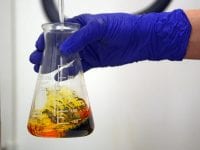Eurofins TestOil VP of Sales and Marketing Mike Barrett recently sat down with Plant Services Magazine Editor-in-Chief Thomas Wilk for a podcast filled with insights derived from decades of experience in oil analysis. Topics included what makes programs work, what trouble spots programs run into, and where listeners can improve their own oil analysis program.…
Read more
Industrial Oil Testing: Expert Tips from Plant Services Podcast





